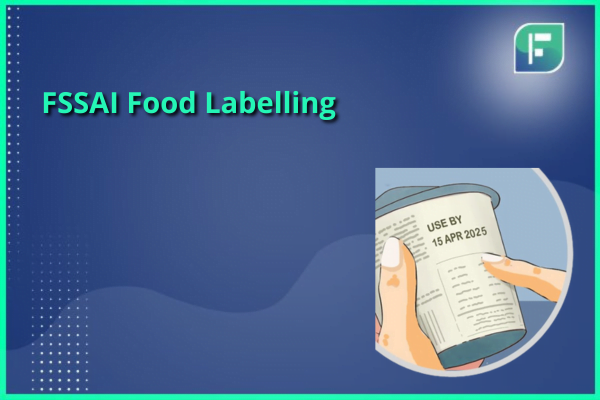Government bodies worldwide implement stringent policies governing food labelling and packaging design. In India, the Food Safety and Standards Authority of India holds the mandate for establishing and assuring adherence to food labelling standards. Whenever a new food product is launched or packaging is modified, producers are mandated to adhere to FSSAI food labelling directives.
Given the numerous rules outlined by FSSAI for labelling, mistakes can easily occur. A simple oversight in following these rules could result in fines, penalties, recalls of products, or delays in planned product launches. However, having a good understanding of FSSAI’s labelling regulations allows you to deal through these potential pitfalls and ensure your product meets all the necessary requirements.
Understanding FSSAI Food Labelling Regulations
Food Safety and Standards Authority of India has established comprehensive regulations governing the labelling of food products. These regulations are vital for ensuring transparency and consumer safety. The FSSAI food labelling regulations encompass various key aspects, as detailed below:
1. Name of the Food
FSSAI mandates that every packaged food item must prominently display the product’s name using the prescribed font as per FSSAI food labelling rules. This is to ensure clarity and consistency in product identification.
2. The List of Ingredients
Manufacturers are required to list all the ingredients used in the preparation of the final food product. Full transparency in ingredient disclosure is essential to prevent consumers from being unaware of any components in the food.
3. Nutritional Information
The labelling must include detailed information about the nutritional content of the product. This information should cover calories and the breakdown of calories received from trans fat, saturated fat, sodium, cholesterol, etc. and other essential vitamins contained in the product.
4. Declaration Regarding Non-vegetarian or Vegetarian
In consideration of cultural and religious preferences, FSSAI food labelling regulations require manufacturers to clearly state whether a food product contains non-vegetarian ingredients. This is indicated by a small dot on the label’s corner – a red dot for non-vegetarian and a green dot for vegetarian products.
5. Declaration Regarding Food Additives Used
Additives, which enhance food appearance and taste or preserve flavour, must be declared on the label. This ensures consumers are aware of any additional substances present in the product.
6. Name and Complete Address of the Manufacturer
The label should prominently display the manufacturer’s name, complete address, and the place of manufacturing. This information is essential for accountability and consumer inquiries.
7. Customer Care Details
The label should include contact details for the customer support centre, making it easy for consumers to reach out with inquiries or concerns.
8. Quantity
The net quantity or packaged weight of the food product must be clearly mentioned on the label. This helps consumers assess the amount of product they are purchasing.
9. Retail Sale Price
The maximum retail price at which the product is sold should be prominently displayed on the label. This ensures price transparency for consumers.
10. FSSAI Logo and Licence Number
The FSSAI logo and food licence online number must be prominently displayed on the label. These elements are crucial for verifying the product’s compliance with FSSAI food labelling standards.
11. Batch/Code/Lot Number
The inclusion of batch or lot numbers on the label helps ensure authenticity and traceability of the product, as it provides information about the manufacturing process.
12. Manufacturing Date and the Best Before/Use-by Date
The manufacturing date and the best before/use-by date should be clearly mentioned on the label. This information is vital for consumers to determine the product’s freshness and safety.
13. User Instructions
Manufacturers must provide clear instructions for using the product on the label. This ensures consumers know how to handle and prepare the item correctly.
14. Country of Origin (For Imported Food)
For imported foods, FSSAI regulations mandate the inclusion of the country of origin on the label. This information informs consumers about where the product was grown, manufactured, or processed.
15. FSSAI Licence Number
The label of the product must prominently display the FSSAI logo and licence number in a contrasting colour to the packaging background. This makes it easy for consumers to identify products that comply with FSSAI regulations.
The FSSAI food labelling regulations play a very important role in protecting consumer interests and guaranteeing food safety, transparency, and accountability within the food industry. Manufacturers and brands are obligated to follow these guidelines to furnish consumers with precise and thorough details regarding the products they buy.
Need for FSSAI Registration
The requirement for FSSAI registration stems from the necessity for all food business operators engaged in food product trade. Acquiring an FSSAI licence or registration is not only a legal imperative but also a measure that fosters consumer confidence, consequently encouraging consumers to choose your products. This registration is also an assurance that the food product is safe for consumption and its quality remains uncompromised.
Final Thoughts
The FSSAI food labelling regulations play a vital role in safeguarding the interests of consumers in India. By mandating clear and comprehensive labelling, these regulations ensure transparency, safety, and informed choices for individuals purchasing packaged food products. From ingredient disclosure to nutritional information and allergen warnings, FSSAI guidelines empower consumers to make healthy and well-informed decisions about the food they consume.
Furthermore, these rules also encourage responsibility in the food business. They require manufacturers to follow clear rules when labelling their products. This strengthens the promise of looking out for the well-being and safety of consumers.






